China lauds Russia relations and calls for strengthened Asia-Pacific role
Beijing official said relations with Moscow are at an historic high.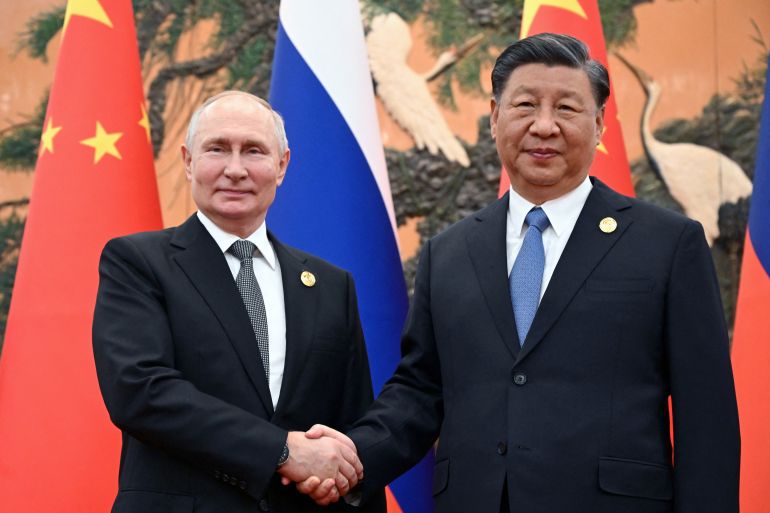 Russian President Vladimir Putin shakes hands with Chinese President Xi Jinping during a meeting at the Belt and Road Forum in Beijing, China, on October 18, 2023 [Reuters]
Russian President Vladimir Putin shakes hands with Chinese President Xi Jinping during a meeting at the Belt and Road Forum in Beijing, China, on October 18, 2023 [Reuters]
China has heralded historically strong relations with Russia as it called for the pair to coordinate on security, stability and development in the Asia-Pacific region.
China and Russia should play a “better role as an anchor of stability in the changing circumstances of the century,” the foreign ministry in Beijing said in a statement issued on Wednesday following a visit to Moscow by Vice Foreign Minister Sun Weidong.
KEEP READING
list of 4 items
list 1 of 4
‘Are the lives of a few hundred Ukrainians worth a crab or salmon?’
list 2 of 4
‘Mobster’ Putin must answer for what he’s done: Navalny’s widow
list 3 of 4
Zelenskyy in Saudi Arabia to push for peace, POW deal with Russia
list 4 of 4
Germany, NATO rule out sending troops to Ukraine as Russia rebukes Macron
end of list
Although wary of damaging ties with the West, Beijing has refused to condemn Russia’s invasion of Ukraine, and relations between the two BRICS states have remained warm amid the war.
Sun said in the statement that “under the strategic guidance of President Xi Jinping and President Putin … relations between the two countries are at the best period in history”.
Suspicion
Such statements will do little to quell suspicion in the West, which has viewed Moscow and Beijing with increased anxiety over the past two years as they ramp up ties in trade and defence.
Beijing has responded with anger as Chinese companies have been blacklisted by the United States and European Union for their role in helping Russia evade trade sanctions.
Moscow has looked to Beijing as a crucial economic lifeline amid the sanctions, while China has benefitted from cheap energy imports and access to vast natural resources.
At the same time, China’s interest in Russia’s sparsely populated, resource-rich, far-eastern region has long been viewed with some concern in Moscow, which sits 11 time zones westwards.
Sun stressed Chinese hopes of deepening “coordination” in the Asia-Pacific region, extolling the role of the Shanghai Cooperation Organisation (SCO), a Eurasian political, economic, international security and defence organisation established in 2001.
“Both sides should promote the SCO to better play its role as a ‘stabilizing anchor’ in the century-old changes, strengthen communication and coordination in Asia-Pacific regional affairs, and jointly safeguard regional security, stability and development,” he said.
Sign up for Al Jazeera
Weekly Newsletter
The latest news from around the world. Timely. Accurate. Fair.
Sign upBy signing up, you agree to our Privacy Policy
protected by reCAPTCHA
During his trip to the Russian capital, the Chinese official also exchanged views with Moscow’s foreign minister Sergey Lavrov on the Ukraine crisis, the situation on the Korean peninsula, and other international and regional matters, the statement noted, without offering details.
Separately, a spokesperson for the Chinese foreign ministry said on Wednesday that its special representative for Eurasian affairs will tour Russia, Poland, Ukraine, Germany and France in early March to promote a political settlement of the Ukraine crisis.
ll3Media International Boards ‘The Accidental President,’ About Sviatlana Tsikhanouskaya: ‘Putin Has Been Aided by Neighboring Poodle Alexander Lukashenko’ (EXCLUSIVE)
 Courtesy of the International Documentary Film Festival Artdocfest/Riga
Courtesy of the International Documentary Film Festival Artdocfest/Riga
All3Media International has boarded documentary “The Accidental President” about Belarusian political activist – and 2020 presidential candidate – Sviatlana Tsikhanouskaya.
Her husband Sergei Tikhanovsky decided to run against Alexander Lukashenko the same year, only to be arrested. As a result, she entered herself into the race. Although she reportedly won the popular vote, after Lukashenko – who has been in the office since 1994 – was declared a winner once again, forcing her into exile.
In 2025, Lukashenko intends to seek reelection.
The company has joined forces with Roast Beef Productions– also behind “Who Is Ghislaine Maxwell?” and “Pussy Riot: A Punk Prayer” – while Mike Lerner and Martin Herring direct.
“The Accidental President” is produced in association with All3Media International, Germany’s NDR and Doc Society.
All3Media International is also behind “Fever Pitch: The Rise of the Premier League,” “Escape to the Chateau,” “Great British Menu” and “Four in a Bed.” Its formats include “The Traitors,” “Gogglebox” and “Undercover Boss.”
“Today, the world has finally woken up to Putin’s tyrannical war against democracy and freedom. This film will show how Putin has been aided and abetted by his neighboring poodle, the fake president Alexander Lukashenko, in their attempt to destroy democracy both in Belarus and Ukraine,” declared the directors, who already collaborated as producers on Oscar-nominated “Hell and Back Again” about soldiers returning from Afghanistan.
“The awe-inspiring bravery of Sviatlana Tsikhanouskaya, and the thousands of ordinary Belarusians who refuse to accept this tyranny, is an example to all of us of the power of the individual to fight for truth and justice.”
The film, diving right into her surprising journey from primary school teacher to politician, and providing “unprecedented access” to the opposition leader and her team, is about “the struggle for justice in the face of state terror and the hopes of a nation to create a new democratic country out of the ruins of its Soviet past,” it was stated.
It will be shown at the One World Festival in Prague and the International Documentary Film Festival Artdocfest/Riga.
“Following our global sales success with three-parter ‘Who Is Ghislaine Maxwell?,’ we’re very pleased to announce our latest collaboration with the genre-leading creative team at Roast Beef Productions,” said Rachel Job, SVP non-scripted content at All3Media International.
“The Accidental President’ puts the spotlight on a woman whose life has been profoundly transformed as she fights for the future of her country. Through Sviatlana Tsikhanouskaya’s extraordinary story audiences around the world can get unique insight into this high-stakes struggle for democracy in Europe’s last dictatorship.”
Continued efforts needed to fight antimicrobial resistance (AMR) in humans and animals
Resistance of Salmonella and Campylobacter bacteria to commonly used antimicrobials continues to be observed frequently in humans and animals, according to a report issued today by the European Food Safety Authority (EFSA) and the European Centre for Disease Prevention and Control (ECDC). However, the combined resistance to critically important antimicrobials for human medicine remains very low, except in some types of Salmonella and Campylobacter coli in some countries.
However, the combined resistance to critically important antimicrobials for human medicine remains very low, except in some types of Salmonella and Campylobacter coli in some countries.
Moreover, there has been an increase in the proportion of Escherichia coli isolates from food-producing animals that exhibit ‘complete susceptibility ’ or ‘zero resistance’ to key antimicrobials. This, alongside a decrease in the prevalence of E. coli isolates that produce ESBL or AmpC — enzymes which can make some antibiotics ineffective — demonstrates progress in reducing antimicrobial resistance (AMR) in E. coli from food-producing animals across several EU Member States.
Carlos Das Neves, EFSA Chief Scientist and Mike Catchpole, ECDC Chief Scientist said: “While we have seen positive results from actions to reduce AMR, continued joint efforts are essential to tackle this global threat. The One Health approach reminds us that addressing AMR requires collaboration across different sectors, such as human health, animal health and the environment”.
For Salmonella, resistance to carbapenems was found in isolates from humans, but not from food-producing animals; for E. coli, carbapenem resistance was detected in isolates from food-producing animals[1]. Although the occurrence of carbapenem resistance is currently reported at very low levels in isolates from both humans and animals, a higher number of countries have reported bacteria producing carbapenemase enzymes in various animal species in recent years. This requires attention and further investigation since carbapenems are a last-resort group of antibiotics and any detection of resistance to them is concerning.
Between 2013 and 2022, for humans, at least half of the reporting countries observed increasing trends in resistance to fluoroquinolones in Salmonella Enteritidis and Campylobacter jejuni isolates, usually associated with poultry. This finding is of public health concern, as in the rare occasions when Salmonella or Campylobacter infections turn into severe illness, fluoroquinolones are amongst the antimicrobials used for treatment.
One-third of the countries observed decreasing trends in macrolide resistance in Campylobacter isolates from humans, in particular for C. coli. This is noteworthy as increased resistance to fluoroquinolones means that macrolides are becoming more important for the treatment of severe foodborne infections in humans.
In two-thirds of reporting countries, resistance in isolates from humans to penicillins and tetracyclines decreased over time in Salmonella Typhimurium -which is usually associated with pigs and calves. These antimicrobials are often used to treat bacterial infections in humans and animals.
Antimicrobial resistance remains a major public health concern that needs to be tackled on various fronts and by different actors. Key actions are needed to reduce the emergence and spread of antimicrobial-resistant bacteria. These include promoting prudent use of antimicrobials; supporting improvements in infection prevention and control practices; strengthening research and innovation in developing new antimicrobials; and ensuring that policies and procedures are in place at the national level.
EFSA is also publishing several interactive communication tools.
Hong Kong property stocks jump after city scraps cooling measures
KEY POINTS
- Stocks of Hong Kong property developers rose after financial secretary Paul Chan scrapped Hong Kong’s property cooling measures in a bid to bolster the sector.
- In his budget speech on Wednesday, Chan announced that Hong Kong will be scrapping all buy-side property tightening measures for residential properties with immediate effect.
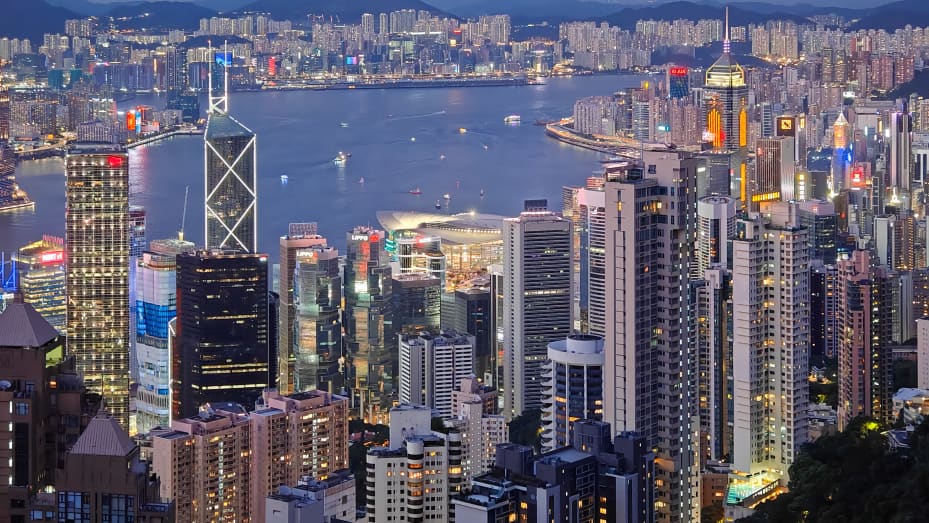 An urban view of high-rise buildings at dusk as seen from Hong Kong’s Victoria Peak.
An urban view of high-rise buildings at dusk as seen from Hong Kong’s Victoria Peak.
Nurphoto | Nurphoto | Getty Images
Stocks of Hong Kong developers rose after Financial Secretary Paul Chan scrapped property cooling measures in a bid to bolster the sector, which has been weighed down by high borrowing costs and weak economic sentiment.
In his budget speech on Wednesday, Chan announced that Hong Kong will withdraw all buy-side tightening measures for residential properties and waive stamp duties payable on the transfer of REIT units with immediate effect.
The Hang Seng Property index jumped 2.4% following the announcement, but has since slipped from session highs, while the broader Hang Seng index fell 1.47%. New World Development shares jumped as much as over 8% before currently trading at 4%, and Hysan Development added 0.3%. Sun Hung Kai Properties and CK Asset rose 1.35% and 0.55% respectively, while Henderson Land Development traded 3.83% higher.
Hong Kong’s housing prices, once the most expensive in the world, have plunged almost 20% since their peak in 2021 on the back of rising interest rates and dimmer market sentiment. WATCH NOW
WATCH NOW
VIDEO02:58
Hong Kong budget: Real estate expert discusses the scrapping of property curbs
The sale and purchase agreements for all building units in 2023 fell 2.7% from a year ago, according to the city’s Land Registry. Sales were also nearly 40% lower than 2021. The government’s home price index also declined for the ninth straight month in January, falling 1.57%.
“With these reductions in stamp duty, I think we’ll see certainly a fairly quick pickup and transaction volumes,” Peter Churchouse, managing director of Portwood Capital, a leading real estate investment company. “Then towards the back end of the year, we might start to see a little bit of a pickup in property prices.”
Up until recently, the city imposed a 7.5% stamp duty on non-permanent residents purchasing property as well as additional properties purchased by permanent residents. The rates for both levies were slashed from 15% in October.
Churchouse added that this could “be a bit of a positive flip” for the wider Hong Kong stock market as it is highly correlated with the residential property market. Hong Kong’s stock markets have plunged around 40% from its highs a couple of years ago.
“We might see a little bit of light at the end of the stock market tunnel,” he said.
Chan also signaled more room to ease policies on property lending. Hong Kong’s Monetary Authority is set to make announcements later in the day.
Chan added he is expecting the economy to grow in a range of 2.5% to 3.5% this year.
Hong Kong’s government is also rolling out over 1 billion Hong Kong dollars ($127 million) to support its tourism industry.
Myanmar: Young people attempt to flee ahead of conscription order
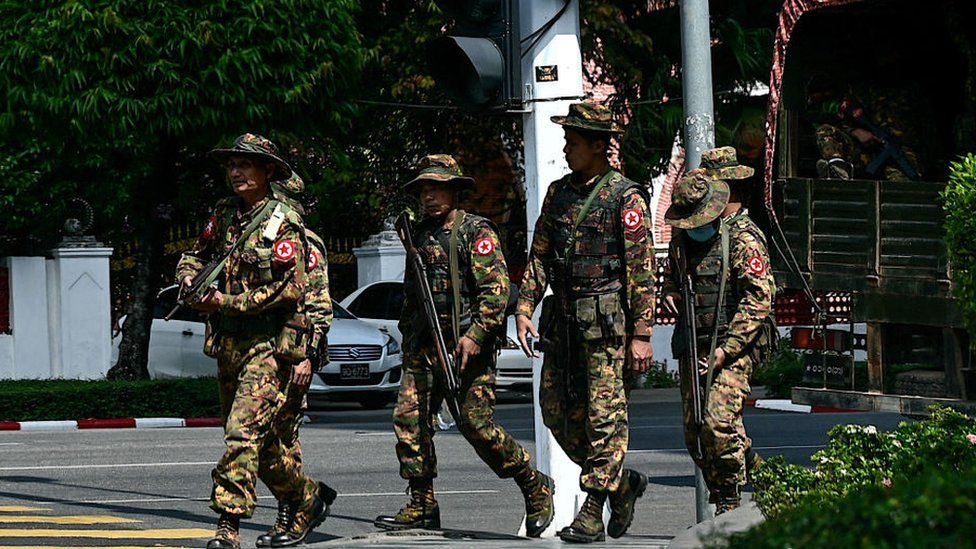 IMAGE SOURCE,
IMAGE SOURCE,
GETTY IMAGES
Image caption,
On 1 February, Myanmar entered its fourth year since the coup
By Kelly Ng
BBC News, Singapore
A deadly stampede outside a passport office that took two lives and unending lines outside embassies - these are just some examples of what has been happening in Myanmar since the announcement of mandatory conscription into the military.
Myanmar's military government is facing increasingly effective opposition to its rule and has lost large areas of the country to armed resistance groups.
On 1 February 2021, the military seized power in a coup, jailing elected leaders and plunging much of the country into a bloody civil war that continues today.
Thousands have been killed and the UN estimates that around 2.6 million people been displaced.
Young Burmese, many of whom have played a leading role protesting and resisting the junta, are now told they will have to fight for the regime.
Many believe that this is a result of the setbacks suffered by the military in recent months, with anti-government groups uniting to defeat them in some key areas.
"It is nonsense to have to serve in the military at this time, because we are not fighting foreign invaders. We are fighting each other. If we serve in the military, we will be contributing to their atrocities," Robert, a 24-year-old activist, told the BBC.
Many of them are seeking to leave the country instead.
"I arrived at 03:30 [20:30 GMT] and there were already about 40 people queuing for the tokens to apply for their visa," recalled a teenage girl who was part of a massive crowd outside the Thai embassy in Yangon earlier in February. Within an hour, the crowd in front of the embassy expanded to more than 300 people, she claims.
"I was scared that if I waited any longer, the embassy would suspend the processing of visas amid the chaos," she told the BBC, adding that some people had to wait for three days before even getting a queue number.
In Mandalay, where the two deaths occurred outside the passport office, the BBC was told that there were also serious injuries - one person broke their leg after falling into a drain while another broke their teeth. Six others reported breathing difficulties.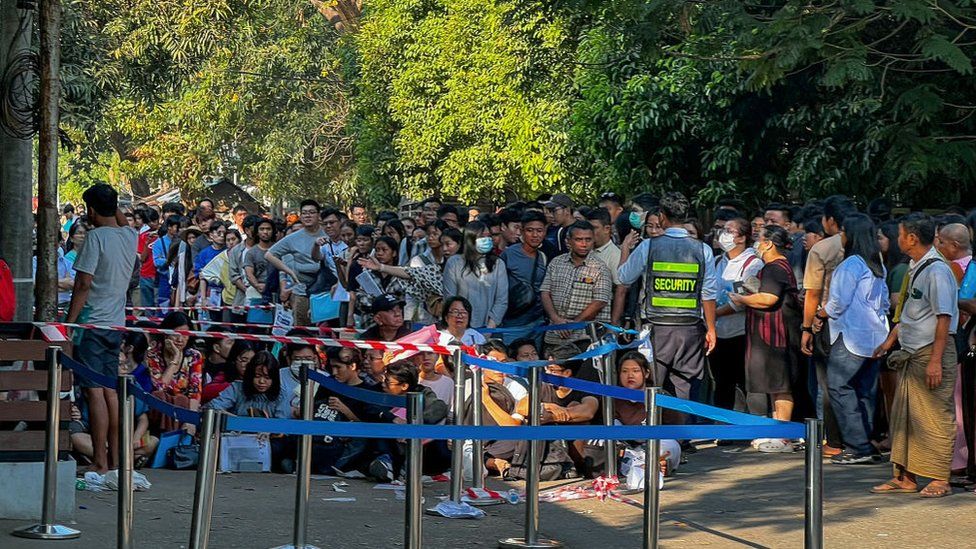 IMAGE SOURCE,
IMAGE SOURCE,
GETTY IMAGES
Image caption,
People gathering outside the Thai embassy in Yangon
Justine Chambers, a Myanmar researcher at the Danish Institute of International Studies, says mandatory conscription is a way of removing young civilians leading the revolution.
"We can analyse how the conscription law is a sign of the Myanmar military's weakness, but it is ultimately aimed at destroying lives... Some will manage to escape, but many will become human shields against their compatriots," she said.
Myanmar's conscription law was first introduced in 2010 but had not been enforced until on 10 February the junta said it would mandate at least two years of military service for all men aged 18 to 35 and women aged 18 to 27.
Maj-Gen Zaw Min Tun, the spokesperson for the military government, said in a statement that about a quarter of the country's 56 million population were eligible for military service under the law.
The regime later said it did not plan to include women in the conscript pool "at present" but did not specify what that meant.
The government spokesperson told BBC Burmese that call-ups would start after the Thingyan festival marking the Burmese New Year in mid-April, with an initial batch of 5,000 recruits.
The regime's announcement has dealt yet another blow to Myanmar's young people.
Many had their education disrupted by the coup, which came on top of school closures at the height of the Covid-19 pandemic.
In 2021, the junta suspended 145,000 teachers and university staff over their support for the opposition, according to the Myanmar Teachers' Federation, and some schools in opposition-held areas have been destroyed by the fighting or by air strikes.
Then there are those who have fled across borders seeking refuge, among them young people looking for jobs to support their families.
In response to the conscription law, some have said on social media that they would enter the monkhood or get married early to dodge military service.
The junta says permanent exemptions will be given to members of religious orders, married women, people with disabilities, those assessed to be unfit for military service and "those who are exempted by the conscription board". For everyone else, evading conscription is punishable by three to five years in prison and a fine.
But Robert doubts the regime will honour these exemptions. "The junta can arrest and abduct anyone they want. There is no rule of law and they do not have to be accountable to anyone," he said.
Wealthier families are considering moving their families abroad - Thailand and Singapore being popular options, but some are even looking as far afield as Iceland - with the hope that their children would get permanent residency or citizenship there by the time they are of conscription age.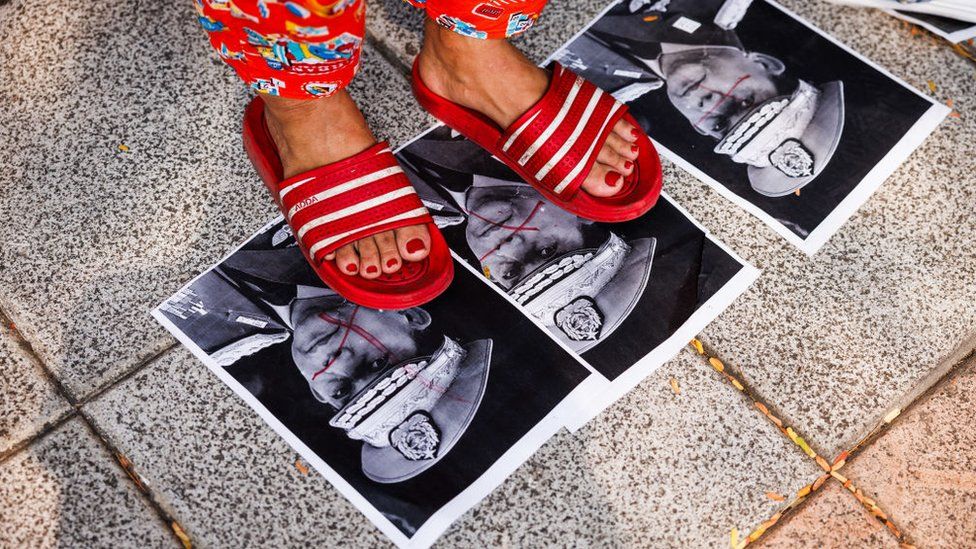 IMAGE SOURCE,
IMAGE SOURCE,
GETTY IMAGES
Image caption,
Myanmar people step on photos of military junta leader Gen Min Aung Hlaing during a gathering marking three years since the coup
Others have instead joined the resistance forces, said Aung Sett, from the All Burma Federation of Student Unions, which has a long history of fighting military rule.
"When I heard the news that I would have to serve in the military, I felt really disappointed and at the same time devastated for the people, especially for those who are young like me. Many young people have now registered themselves to fight against the junta," the 23-year-old told the BBC from exile.
Some observers say the enforcement of the law now reveals the junta's diminishing grip on the country.
Last October, the regime suffered its most serious setback since the coup. An alliance of ethnic insurgents overran dozens of military outposts along the border with India and China. It has also lost large areas of territory to insurgents along the Bangladesh and Indian borders.
According to the National Unity Government, which calls itself Myanmar's government in exile, more than 60% of Myanmar's territory is now under the control of resistance forces.
"By initiating forced conscription following a series of devastating and humiliating defeats to ethnic armed organisations, the military is publicly demonstrating just how desperate it has become," said Jason Tower, country director for the Burma programme at the United States' Institute of Peace.
- A turning point in Myanmar as army suffers big losses
- Who are the rulers who executed Myanmar activists?
Mr Tower expects the move to fail because of growing resentment against the junta.
"Many youth dodging conscription will have no choice but to escape into neighbouring countries, intensifying regional humanitarian and refugee crises. This could result in frustration growing in Thailand, India, China and Bangladesh, all of which could tilt away from what remains of their support for the junta," he said.
Even if the military does manage to increase troop numbers by force, this will do little to address collapsing morale in the ranks. It will also take months to train up the new troops, he said.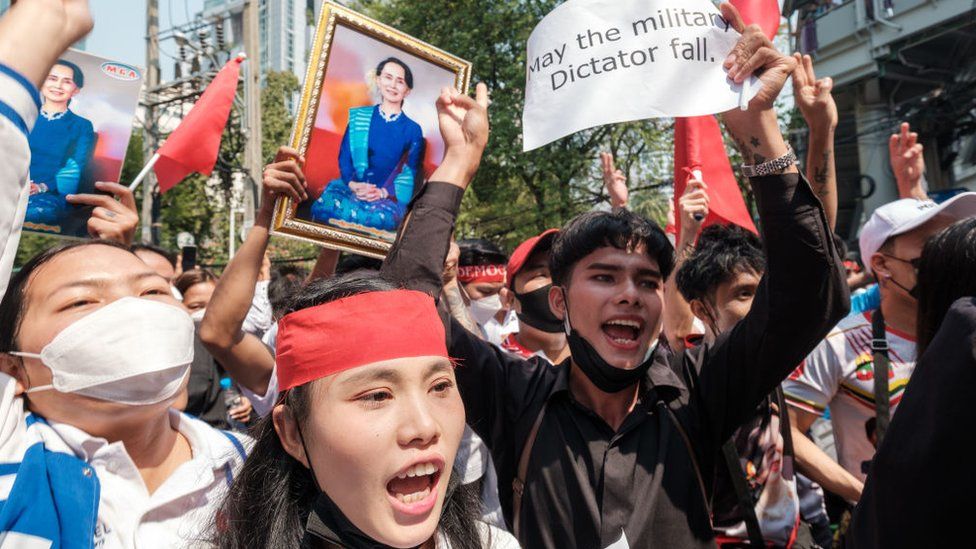 IMAGE SOURCE,
IMAGE SOURCE,
GETTY IMAGES
Image caption,
Protesters gather in front of the Myanmar Embassy in Bangkok, Thailand
The junta had a long history of "forced recruitment" even before the law was enacted, said Ye Myo Hein, a global fellow at the Woodrow Wilson International Center for Scholars.
"So the law may merely serve as a facade for forcibly conscripting new recruits into the military. With a severe shortage of manpower, there is no time to wait for the lengthy and gradual process of recruiting new soldiers, prompting [officials] to exploit the law to swiftly coerce people into service," he said.
Even for those who will manage to escape, many will carry injuries and emotional pain for the rest of their lives.
"It has been really difficult for young people in Myanmar, both physically and mentally. We've lost our dreams, our hopes and our youth. It just can't be the same like before," said Aung Sett, the student leader.
"These three years have gone away like nothing. We've lost our friends and colleagues during the fight against the junta and many families have lost their loved ones. It has been a nightmare for this country. We are witnessing the atrocities committed by the junta on a daily basis. I just can't express it in words."
Additional reporting by BBC Burmese





































